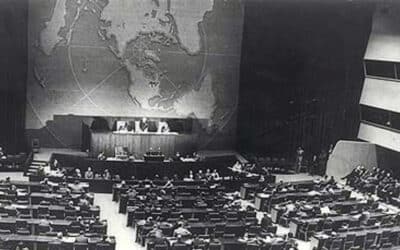A draft memorandum from the Justice Department’s Office of Legal Counsel dated January 9, 2002, entitled “Application of Treaties and Laws to al Qaeda and Taliban Detainees”, was written to inform the Department of Defense that the U.S. government, in the “war on terrorism”, need not conform to the standards of warfare defined in the Geneva Conventions. In the memo, Deputy Assistant Attorney General John Yoo and Special Counsel Robert J. Delahunty outline the arguments behind this assumption.
The memo was produced after the Pentagon inquired “whether the laws of armed conflict apply to the conditions of detention and the procedures for trial of members of al Qaeda and the Taliban militia”, and concluded that “these treaties do not protect members of the al Qaeda organization” and “do not apply to the Taliban militia”, while at the same time “expresses no view as to whether the President should decide, as a matter of policy, that the U.S. Armed Forces should adhere to the standards to conduct in those treaties with respect to the treatment of prisoners.”
The argument is structured around the War Crimes Act (WCA), which “directly incorporates several provisions of international treaties governing the laws of war into the federal criminal code.” The first part of the memo “describes the WCA and the most relevant treaties that it incorporates”, which include “the four 1949 Geneva Conventions”. The second part “examines whether al Qaeda detainees can claim the protections of these agreements.” The third part “discusses whether the same treaty provisions, as incorporated through the WCA, apply to the treatment of captured members of the Taliban militia.” The fourth part of the memo addresses “the question whether any customary international law of armed conflict might apply to the al Qaeda or Taliban militia members detained during the course of the Afghanistan conflict.”
The War Crimes Act “renders certain acts punishable as ‘war crimes'”, a term that “incorporates, by reference, certain treaties or treaty provisions relating to the laws of war, including the Geneva Conventions.” Among other things, this federal law “criminalizes ‘grave breaches’ of the Geneva Conventions”, defined in Geneva Convention III as:
wilful killing, torture or inhuman treatment, including biological experiments, wilfully causing great suffering or serious injury to body or health, compelling a prisoner of war to serve in the forces of the hostile Power, or wilfully depriving a prisoner of war of the rights of fair and regular trial prescribed in this Convention.
The Geneva Conventions also “require the High Contracting Parties to enact penal legislation to punish anyone who commits or orders a grave breach.” Furthermore, “each State party has the obligation to search for and bring to justice…anyone who commits a grave breach. No State party is permitted to absolve itself or any other nation of liability for committing a grave breach.”
With a nod from the Justice Department, the White House officially adopted a policy of disregard for the Geneva Conventions. This policy gave tacit approval for the Pentagon to engage in activities which would violate these principles of International Humanitarian Law by declaring that anyone guilty of such breaches would not be held accountable.
The War Crimes Act codified into federal law common Article 3 of the Geneva Conventions, a fact which “may require the United States, as a High Contracting Party, to follow certain rules even if the other parties to the conflict are not parties to the Conventions.” While common Article 3 “complements common Article 2” which “applies to cases of declared war or of any other armed conflict that may arise between two or more of the High Contracting Parties”, the argument put forth by the Justice Department for absolving the United States of liability of its obligations under the Conventions is that Common Article 3, which “covers ‘armed conflict not of an international character'” does not apply to the war in Afghanistan. “If we were to read the Geneva Conventions as applying to all forms of armed conflict,” the memo argues, “we would expect the High Contracting Parties to have used broader language, which they easily could have done.”
Thus, by drawing a distinction between Articles 2 and 3 of the Geneva Conventions, and removing the statutes of 3 from those contained in 2, the Justice Department puts forth the argument that the intent of the Geneva Conventions was to allow in some circumstances what would be considered “grave breaches” in other circumstances.
It is this Pharisaic interpretation of International Humanitarian Law which led directly to an official policy which, in turn, led directly to such prisoner abuses as are commonly reported to occur at Guantanamo Bay, Cuba, as well as those witnessed by the world in photographic evidence from the Abu Ghraib prison facility in Iraq.
“Any congressional effort to restrict presidential authority by subjecting the conduct of the U.S. Armed Forces to a broad construction of the Geneva Convention”, the Justice Department asserts, “would represent a possible infringement on presidential discretion to direct the military.” In other words, if the President desires that the military be free to violate the Geneva Conventions, the American people have no power to say otherwise.
The memo further argues that any prisoners arbitrarily deemed a member “of the al Qaeda terrorist organization”, because “al Qaeda” is a “non-State actor”, are not entitled to “receive the protections of the laws of war”, which means that “neither their detention nor their trial…is subject to the Geneva Conventions”. Hence, although the Geneva Conventions state that “No State party is permitted to absolve itself…of liability for committing a grave breach”, the Justice Department’s argument is that since al Qaeda is not a State party to the Geneva Conventions, the United States can therefore absolve itself of liability for committing any “grave breach”.
Prisoners deemed “members of the Taliban militia”, however, present “a more difficult legal question.” Because “Afghanistan has been a party to all four the Geneva Conventions”, it might be argued “that this requires application of the Geneva Conventions to the present conflict”. But because the Justice Department does not regard the Taliban as “the de facto government of that nation”, but regards Afghanistan as a “failed state”, any person detained in the war “is therefore not entitled to the protections of the Geneva Conventions.”
This brings the authors of the memo to address “a point of considerable significance”, which is “To say that the specific provisions of the Geneva and Hague Conventions do not apply in the current conflict with the Taliban militia as a legal requirement is by no means to say that the principles of the law of armed conflict cannot be applied as a matter of U.S. Government policy.” What this means is that, although U.S. forces could not be held accountable for any “grave breach” of the Geneva Convention, “The President as Commander in Chief can determine as a matter of his judgment…that the policy of the United States will be to enforce customary standards of the law of war against the Taliban and to punish any transgressions against those standards.” Hence, while it would not be considered unlawful for U.S. troops to torture any Taliban prisoners, “the United States may deem it a violation of the laws and usages of war for Taliban troops to torture any American prisoners” (emphasis added). While no member of the U.S. military could be prosecuted for war crimes in the conflict, “The U.S. military thus could prosecute Taliban militiamen for war crimes”. The decision to “apply the principles of the Geneva Conventions or other laws of war” only to other parties to international conflict, the memo notes, “would be fully consistent with the past practice of the United States”, as evidenced by the examples of “the wars in Korea and Vietnam”, the “interventions in Panama and Somalia”, and also by interventions in “Haiti and Bosnia”.
Finally, the memo notes that “substance” of the Geneva Conventions “has received such universal approval that it has risen to the status of customary international law”, and therefore is regarded as universal in application. Since regarding the intent and spirit of International Humanitarian Law in this manner would otherwise dispel the Justice Department’s legalistic reading of the letter, the memo argues that “customary international law cannot bind the executive branch under the Constitution because it is not federal law.”
Thus, we return to the War Crimes Act, which, in fact, and contrary to the Justice Department’s hypothesis, does indeed codify the customary international law of the Geneva Conventions as federal law.
But with this sleight-of-hand legalism, the Justice Department was able to convince a Pentagon and White House who were more than willing to be convinced that customary standards of International Humanitarian Law “war on terrorism” do not apply to the U.S. — a party to the Geneva Conventions — but only to the “non-State” or “failed State” parties — which, by definition, cannot be a party to the convention. In short, the interpretation of the law handed down by the Justice Department is that the United States alone is free to disregard international law. It is only parties other than the U.S. which are liable for prosecution of war crimes.
The overwhelming hypocrisy of this basic assumption, while impossible not to notice, seems to have passed without comment.


